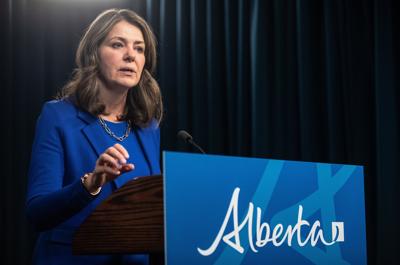During his leadership campaign and now, as prime minister, Mark Carney reached for a loaded phrase:
‚ÄúThe old relationship we had with the United States is over. What exactly the United States does next is unclear. But what is clear is that we as Canadians have agency, we have power. We are masters in our own home,‚ÄĚ Carney said on March 27 after an urgent meeting with a cabinet committee on Canada-U.S. relations. He has used it many times before and since, in both official languages.
That Carney would invoke it now is no accident. With Canada increasingly cast as a geopolitical pawn, masters in our own house‚Ä̬†suddenly has pan-Canadian appeal. For federalists, it‚Äôs a savvy move. Reframing economic sovereignty as a national project taps into real anxieties about trade dependence.
The expression in French ‚ÄĒ ‚ÄúMa√ģtres chez nous‚ÄĚ ‚ÄĒ has a deep historical meaning. For generations of Quebecers, this wasn‚Äôt just a slogan. It was a cri de cŇďur, a rallying cry that captured a province‚Äôs thirst for self-determination and dignity during the Quiet Revolution. Originally a 1960s slogan that fuelled Quebec‚Äôs nationalist movement and the creation of Hydro-Qu√©bec, it symbolized a province taking control of its destiny.
But here’s the rub: invoking the language of self-determination could have unintended consequences: what starts as a reaffirmation of national independence can quickly become a rallying cry for regionalism.
Prime Minister Carney may be trying to signal strength on the world stage. But in doing so, he may also be giving rhetorical oxygen to a different kind of sovereignty movement ‚ÄĒ one that‚Äôs picking up speed in more than one province.
‚ÄúMa√ģtres chez nous‚Ä̬†may resonate more deeply in Quebec, but the sentiment isn‚Äôt exclusive to it anymore. In Alberta, Premier Danielle Smith has already flirted with the idea of provincial autonomy through her Sovereignty Act, and has now declared that she would support if that‚Äôs what the people of Alberta ask for.
In Saskatchewan, Scott Moe talks openly about jurisdictional independence. Even in Ontario, we‚Äôve seen increasing resistance to federal mandates, masked not in nationalist language, but in the assertion of provincial ‚Äúfreedoms.‚ÄĚ
If provinces see themselves as distinct and sovereign “masters in their own homes,” what does that mean for a unified Canada?
Even more, as we watch the King, Canada‚Äôs sovereign, read from the Throne, the multiple layers of “sovereignty” start to blur. It‚Äôs another reminder that while words can unify, they can also divide.
The risk here isn‚Äôt just semantic when provinces, emboldened by economic grievance or cultural frustration, begin to assert that they too want to be ‚Äúmasters in their own house.‚ÄĚ
Add to this the Parti Québécois’ embrace of Alberta’s Premier Danielle Smith, and we see just how slippery this slope may be.
When the PQ’s Paul St-Pierre Plamondon praises Smith’s willingness to stand up for Alberta’s autonomy, he’s not just supporting a fellow provincial leader. He’s normalizing the idea that sovereigntist sentiment now has legitimacy elsewhere. It signals a growing sense that the federal government is a common adversary. And when different regions start aligning around a shared grievance rather than a shared vision, national cohesion begins to fray.
Which brings us back to Carney‚Äôs words. ‚ÄúMasters in our own home‚ÄĚ may be useful in asserting Canada‚Äôs independence abroad, but at home, it‚Äôs becoming harder to know which ‚Äúhome‚ÄĚ we‚Äôre talking about.
If every province starts to see itself as a sovereign actor in a loose federation, then Ottawa risks becoming less a capital and more a suggestion. This is precisely what Donald Trump is hoping for.
Canada has long managed to stay united not because everyone felt the same way, but because enough people believed we were in it together. The danger in today’s sovereignty discourse is that it offers the illusion of strength while quietly dissolving that belief.



























To join the conversation set a first and last name in your user profile.
Sign in or register for free to join the Conversation